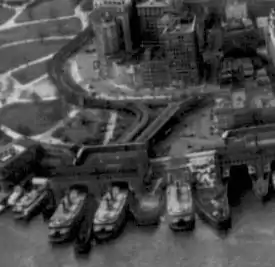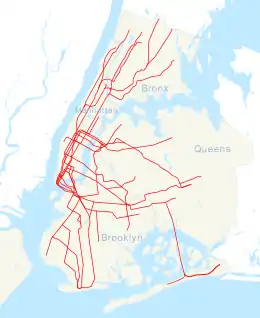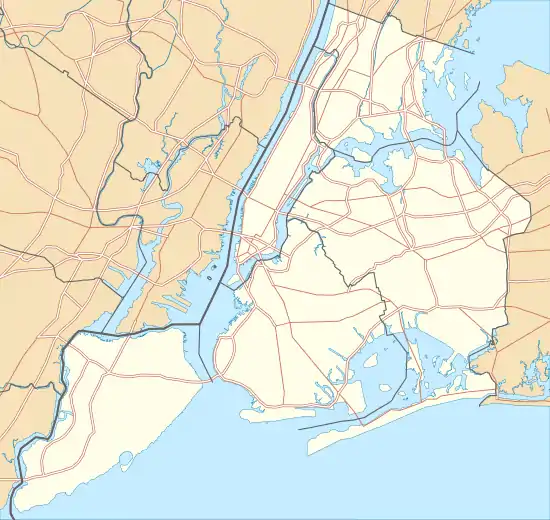South Ferry station (IRT elevated)
The South Ferry station was an elevated station at the southern terminal of the IRT Second, Third, Sixth and Ninth Avenue Lines. It was located next to Battery Park at the lower tip of Manhattan, New York City. Two tracks came from the combined Second and Third Avenue Lines, and two from the Sixth and Ninth Avenue Lines, making four tracks at the terminal, with platforms on the outside and between each pair of tracks (no platform in the center).
South Ferry | |||||||||||||||||||||||||||||||
|---|---|---|---|---|---|---|---|---|---|---|---|---|---|---|---|---|---|---|---|---|---|---|---|---|---|---|---|---|---|---|---|
| Former New York City Subway station | |||||||||||||||||||||||||||||||
 The terminal in 1931 | |||||||||||||||||||||||||||||||
| Station statistics | |||||||||||||||||||||||||||||||
| Address | South Ferry Bus Loop New York, NY 10004 | ||||||||||||||||||||||||||||||
| Borough | Manhattan | ||||||||||||||||||||||||||||||
| Locale | Lower Manhattan | ||||||||||||||||||||||||||||||
| Coordinates | 40°42′05.6″N 74°00′49″W | ||||||||||||||||||||||||||||||
| Division | A (IRT)[1] | ||||||||||||||||||||||||||||||
| Services | IRT Second Avenue Line IRT Third Avenue Line IRT Sixth Avenue Line IRT Ninth Avenue Line | ||||||||||||||||||||||||||||||
| Structure | Elevated | ||||||||||||||||||||||||||||||
| Platforms | 2 island platforms, 2 side platforms | ||||||||||||||||||||||||||||||
| Tracks | 4 | ||||||||||||||||||||||||||||||
| Other information | |||||||||||||||||||||||||||||||
| Opened | April 5, 1877 | ||||||||||||||||||||||||||||||
| Closed | December 22, 1950 | ||||||||||||||||||||||||||||||
| Station succession | |||||||||||||||||||||||||||||||
| Next north | Hanover Square (Second & Third Ave.) Battery Place (Sixth & Ninth Ave.) | ||||||||||||||||||||||||||||||
| Next south | (Terminus) | ||||||||||||||||||||||||||||||
| |||||||||||||||||||||||||||||||
| |||||||||||||||||||||||||||||||
| |||||||||||||||||||||||||||||||
The station was right above access to various ferries at South Ferry, at both the Battery Maritime Building and the Whitehall Terminal. The next stop on the Second and Third Avenue Lines was Hanover Square. The next stop on the Sixth and Ninth Avenue Lines was Battery Place.
The first elevated station at South Ferry was opened April 5, 1877 by the New York Elevated Railroad. It had one island platform between two tracks and was operated as an extension of the company's Ninth Avenue Line. The tracks were later continued straight into the company's Third Avenue Line, which opened August 26, 1878. The four-track station, opened March 1879, was built to provide an adequate terminal for both lines. It was located on a very short branch line, at right angles to the old station, facing toward the ferry terminals. Later the Second and Sixth Avenue Lines also used the terminal. A fire at the station in 1919 damaged the Whitehall Street Terminal.[2][3]: 55
Ridership on the Els began to decline as subway stations were replacing them. The Sixth Avenue Line was eliminated from the station in 1938,[4] the Ninth Avenue Line in 1940,[5] and the Second Avenue Line in 1942.[6][7] When the Third Avenue Line was eliminated in 1950, the station was permanently closed.[8] The station site is currently occupied by the South Ferry subway station.
References
- "Glossary". Second Avenue Subway Supplemental Draft Environmental Impact Statement (SDEIS) (PDF). Vol. 1. Metropolitan Transportation Authority. March 4, 2003. pp. 1–2. Archived from the original (PDF) on February 26, 2021. Retrieved January 1, 2021.
- "BATTERY ELEVATED TERMINAL BURNS; Hundreds of Passengers and Employes Barely Escape as Swift Flamas Sweep Station. EMPLOYES DROP TO STREET Women Crawl Along Roof with Fire Roaring Through Frame Shell Under Them. STARTS UNDER WOODEN CAR An Downtown Firemen and Fleet of Fireboats Kept Busy--Ferry House Damaged". The New York Times. July 3, 1919. ISSN 0362-4331. Retrieved September 20, 2017.
- Staten Island Museum (2014). Staten Island Ferry. Arcadia Publishing. ISBN 9781439647066.
- "GAY CROWDS ON LAST RIDE AS SIXTH AVE. ELEVATED ENDS 60-YEAR EXISTENCE; 350 POLICE ON DUTY But the Noisy Revelers Strip Cars in Hunt for Souvenirs SUIT MAY DELAY RAZING Little Threat Seen to Plan, However-Jobless Workers to Press Their Protest Makes Only One Stop Entrances Are Boarded Up FINAL TRAINS RUN ON ELEVATED LINE Police Guard Structure". The New York Times. December 5, 1938. ISSN 0362-4331. Retrieved April 26, 2018.
- "TWO 'EL' LINES END TRANSIT SERVICE; Part of Ninth Ave., First in the World, and Second Ave. Mark Last Runs PASSING IS NOT MOURNED American Woman's Club Holds Wake in Jubilation Over Cessation of Noise". The New York Times. June 12, 1940. ISSN 0362-4331. Retrieved May 10, 2019.
- "Manhattan East Side Transit Alternatives (MESA): Major Investment Study/Draft Environmental Impact Statement, August 1999". Metropolitan Transportation Authority, United States Department of Transportation, Federal Transit Administration. August 1999. Retrieved July 11, 2016.
- "Discontinuance of service Second Avenue elevated line". nytm.pastperfectonline.com. New York City Board of Transportation. 1942. Retrieved December 4, 2016.
- Parke, Richard H. (December 23, 1950). "Old 'El' Link End Its 72-Year Uproar — Lower East Side Residents Are Happy and Mission Head Now Expects to Sleep" (PDF). New York Times. p. 30. Retrieved November 8, 2016.
External links
![]() Media related to South Ferry (IRT elevated station) at Wikimedia Commons
Media related to South Ferry (IRT elevated station) at Wikimedia Commons


